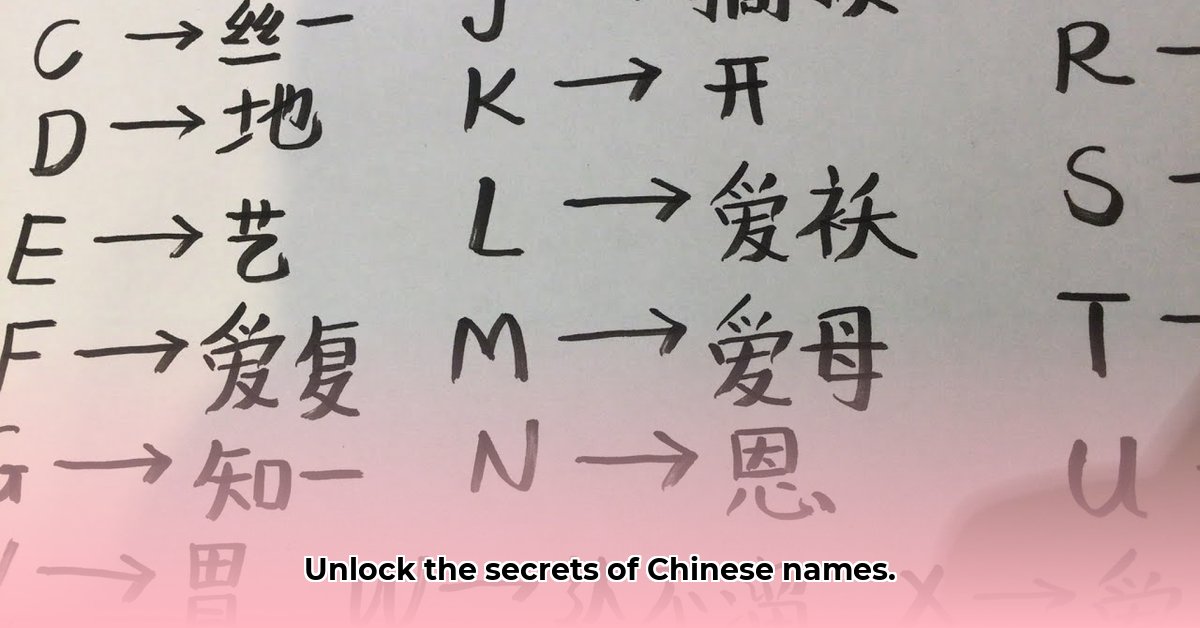Ever wondered what’s behind a Chinese name? It’s more than just a label; it’s a story! This guide dives into the fascinating world of Chinese names, explaining how they’re chosen, what they mean, and the cultural weight they carry. Need help finding the perfect name? Try this Chinese name generator. Whether you’re picking a baby name, doing business in China, learning the language, or are just plain curious, we’ll show you how to understand and appreciate the meaning behind each character. We’ll cover everything from common surnames to choosing the perfect name, offering tips and tricks to avoid mistakes. Let’s uncover the hidden stories within those beautiful characters!
The Significance of Chinese Names
Understanding Chinese names provides a window into a rich culture. Each name is a narrative, reflecting family history, personal aspirations, and deeply ingrained cultural values. It’s more than just a label; it’s a cultural identity, a personal story, and a connection to generations past. By understanding the intricacies of Chinese nomenclature, one can gain a deeper appreciation for the culture itself.
Decoding the Structure: Surnames and Given Names
Chinese names are typically structured with the surname (family name) preceding the given name (personal name). The surname, often a single character, represents the family’s lineage and is passed down through generations. The given name, consisting of one, two, or sometimes three characters, adds individuality and personal meaning. This arrangement underscores the importance of family and the individual within that familial context.
The Weight of Characters: Meaning Beyond Sound
Each character in a Chinese name carries significant meaning, contributing to the name’s overall impact. The selection of these characters is a deliberate process, as subtle differences can dramatically alter the intended significance. The careful consideration of each character is not merely about aesthetics; it’s about bestowing a specific identity and destiny upon the individual.
For example, characters representing strength, wisdom, beauty, or fortune are commonly chosen to imbue the child with these qualities. The art lies in selecting characters that not only resonate individually but also harmonize when combined.
Navigating the Nuances: Sound, Meaning, and Context
Choosing the perfect name involves a delicate balancing act, weighing the sound, meaning, and overall impression. Each element plays a crucial role in how the name is perceived. The sound, or pronunciation, should be pleasing and avoid any unintended negative associations. The meaning should align with the parents’ hopes and aspirations for their child. The overall context, including family history and cultural trends, also plays a role in the selection process.
To truly grasp the essence of a Chinese name, one must examine each character independently, then consider their combined effect. Sometimes, the combination can create unexpected or humorous results if not chosen carefully, highlighting the importance of linguistic and cultural sensitivity.
Tradition and Modernity: A Dynamic Interplay
Traditional naming practices, such as the use of generation names (characters shared by members of the same generation), still hold influence in many families. Simultaneously, modern trends are emerging, reflecting parents’ personal preferences and desires. This dynamic interplay creates a unique blend of honoring the past while embracing the future.
While some families adhere strictly to traditional naming conventions, others opt for more contemporary names that reflect modern values or aspirations. This fusion of tradition and modernity underscores the evolving nature of Chinese culture.
Resources for Unraveling the Mystery
Fortunately, numerous resources are available to aid in deciphering the meanings behind Chinese names, including online dictionaries, specialized databases, and AI-powered tools. However, it’s crucial to exercise caution and critically evaluate these resources, verifying information from multiple reliable sources, especially when dealing with subtle or nuanced interpretations.
Consulting with native Chinese speakers is highly recommended to ensure accuracy and avoid potential misinterpretations. Their cultural insights can prove invaluable in navigating the complexities of Chinese nomenclature.
A Step-by-Step Guide to Deciphering Chinese Names
Here’s a practical guide to help you unravel the meanings behind captivating Chinese names:
- Identify the Surname: The first character typically represents the family surname, linking the individual to their ancestral heritage.
- Examine the Given Name: This usually consists of one to three characters, each contributing to the individual’s unique identity and personality.
- Research Character Meanings: Consult reliable online dictionaries and resources to uncover the specific meaning of each character.
- Analyze the Combined Meaning: How do the meanings of the individual characters interact when placed together? Does the overall meaning align with the intended interpretation?
- Seek Expert Advice (If Possible): If feasible, consult with native Chinese speakers to ensure accuracy and avoid unintentional misinterpretations.
Globalization and Technology’s Impact
Globalization and technological advancements have made exploring diverse naming conventions easier than ever. AI-powered tools and online translators bridge language gaps and aid in interpretation, increasing accessibility and promoting a deeper understanding of Chinese culture.
However, it’s important to remember that technology should complement, not replace, thoughtful engagement and cultural sensitivity. True understanding requires time, consideration, and respect for cultural nuances.
The Evolving Landscape of Chinese Naming
The future of Chinese naming practices will be dynamic and continuously evolving. The interplay between tradition and modernity will continue to shape naming conventions, while technological advancements will undoubtedly play a larger role in the process.
Ultimately, the enduring appeal of Chinese names lies in their ability to encapsulate history, culture, and personal aspirations, creating a vibrant tapestry that connects the past, present, and future. The rich history and constant cultural shifts make it a fascinating and perpetually evolving aspect of Chinese culture.
How to Avoid Negative Connotations When Choosing a Chinese Baby Name
Choosing a name for your child is a significant milestone, particularly when navigating the complexities of Chinese culture. Ensuring proper Chinese baby name selection requires careful consideration to avoid unintentional negative implications. This guide offers practical steps to help you select a meaningful name with positive connotations.
Understanding the Nuances
Chinese names typically consist of a surname followed by one or two given names, each character carrying significant weight and contributing to the overall sound and meaning. Selecting characters with positive connotations is paramount, but how can this best be achieved?
It’s more than just picking aesthetically pleasing characters; you’re crafting a legacy and a cultural identity, so don’t just focus on translated meanings. Instead, consider the sounds, the flow, and the potential for misinterpretations. A name with a positive meaning might sound awkward or have unintended connotations when combined with the surname.
Practical Steps for Positive Name Selection
Here’s a step-by-step guide on how to avoid negative connotations when choosing a Chinese baby name:
- Research Character Meanings Extensively: Conduct thorough research into the meaning of each character, using reputable dictionaries, and consider both the literal and symbolic interpretations.
- Consider Sound and Flow Carefully: The sound of a name is equally important; it shouldn’t sound harsh or awkward. Names often feature a pleasing combination of tones and sounds, so strive for harmonious pronunciation.
- Seek Input from Native Speakers and Elders: Consult native Chinese speakers, preferably elders or those knowledgeable about naming traditions. Their insights are invaluable for identifying potential pitfalls that an outsider might miss.
- Avoid Homophones and Similar-Sounding Words Diligently: Be mindful of words that sound similar to negative terms or concepts. Even a slight resemblance can be problematic.
- Check for Unusual Combinations Intently: Don’t just consider individual character meanings, but also the overall impression created by their combination.
- Consider Cultural Context Broadly: Think about the cultural implications of the characters. Are they relevant to the current time, relevant to your family history, or meaningful to you?
- Test the Waters Thoroughly: Once you’ve shortlisted a few names, ask several native speakers for their input to ensure you’ve considered all angles.
Leveraging Resources Effectively and Safely
Numerous online resources offer assistance, but be cautious. Always verify information, as translation inconsistencies and biases aren’t uncommon. Rely on established dictionaries and cultural resources for more reliable insights.
Be mindful of privacy implications when using online name generators.
Addressing Potential Pitfalls
- Misinterpretations: Online translation can be unreliable, and subtle differences in meaning are easily lost.
- Accidental Humorous Associations: A name might sound comical or negative without deep understanding of the language.
- Outdated or Inappropriate Meanings: The meaning of words can change over time, so check the current usage in the Chinese cultural context.
Key Takeaways
- Thorough research is paramount.
- Native speaker consultation is invaluable.
- Careful consideration of sounds and flow is crucial.
- Awareness of potential homophones or similar-sounding words is essential.
- Multiple layers of meaning should be considered.
- Use established resources and avoid the pitfalls of online-only research whenever possible.
Choosing the Right Chinese Baby Name: A Guide for Modern Parents
Key Takeaways:
- Traditional Chinese names often reflect family lineage and auspicious meanings.
- Modern trends are influencing name choices, creating a blend of tradition and innovation.
- Understanding character meanings is crucial for choosing a meaningful name.
- Consider both the sound and meaning when selecting a name.
Decoding the Structure: Surname and Given Name
Chinese names typically follow a specific structure: surname followed by given name. The surname, inherited from the father, often indicates family lineage and history. The given name, usually one or two characters, is chosen for its auspicious meaning and positive connotations.
- Exploring Female Names that Mean Death and Their Hidden Power - February 20, 2026
- Intriguing Names That Mean Cursed From Lore and Legend - February 19, 2026
- Names That Mean Darkness Or Death From Myth To Modernity - February 18, 2026










